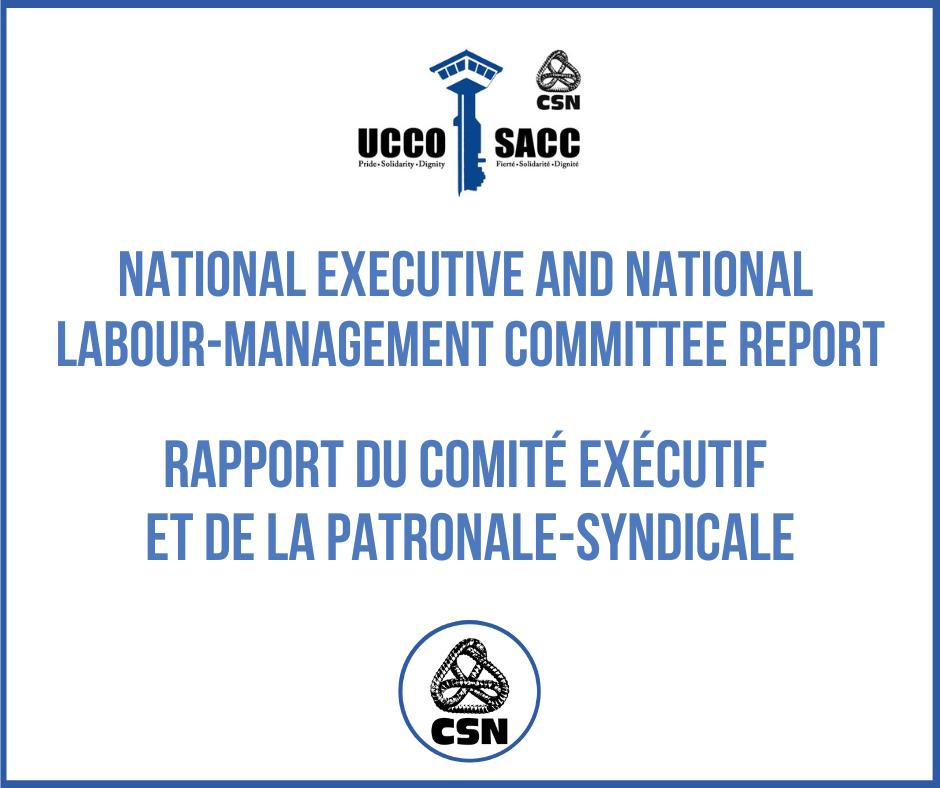The National Labour Management Committee (NLMC) met to review ongoing operational, labour relations, and policy matters affecting correctional officers across the country. The UCCO-SACC-CSN National Executive participated in these discussions and raised multiple issues of national importance, including workplace safety, staffing, budget reductions, and the implementation of federal policies that impact our members. This report provides an overview of the major topics discussed at the table, including updates from the bilateral meetings with representatives of CSC Human Resources (ACHRM) and Operations (ACCOP).
Federal Budget and Workforce Impacts
The National Executive expressed serious concern regarding the proposed 2025–2026 federal budget reductions and their potential effect on public safety and staffing levels within CSC. CSC’s share of the reductions totals $132.2 million, representing 4.6% of its operating budget. To date, CSC has provided no specific breakdown of where these cuts will occur, and suggest they are waiting on direction from the Treasury Board before they can communicate any potential departmental plan to the Union. UCCO-SACC-CSN emphasized that transparency and consultation are essential before any workforce adjustments are made.
Early Retirement Incentive (ERI)
CSC confirmed that the federal government has introduced a voluntary Early Retirement Incentive program to help manage attrition in the public service. Eligibility criteria will depend on an employee’s pension group. At this point, we are still waiting for more information about this new program from Treasury Board.
Workplace Safety and Violence
The National Executive once again highlighted the alarming rise in assaults and violent incidents targeting correctional officers across all regions. In the Prairies, there were 31 assaults on correctional officers reported in October alone. Bodily-fluid and unknown liquid assaults remain a growing issue in the Pacific Region. UCCO-SACC-CSN reminded CSC that the Global Agreement clearly states the employer must seek the informed and written inmate consent for medical disclosure whenever an employee comes into contact with body fluids, regardless of where on the body the contact occurs. Union Executive members across the country continue to experience delayed notifications of incidents and injuries from the National Monitoring Center. UCCO-SACC-CSN demanded that CSC improve communication and ensure that proper follow-up occurs immediately after every event. The Union also drew attention to rising double-bunking rates, particularly in Ontario.
UCCO-SACC-CSN reaffirmed that the safety of our members is non-negotiable and that CSC must take concrete preventative measures to protect staff.
Institutional Pressures and Staffing
CSC continues to accept a growing number of inmates from provincial systems, approximately 40 inmates per week in Ontario, where the issue is most acute. Our message was clear: Correctional Officers are not here to warehouse people. Staffing levels, resources, and infrastructure must align with population growth. The National Executive also raised the issue of ordered overtime, particularly in Drummondville, where operational adjustments have not been implemented. We cautioned CSC that prolonged overwork risks burn out and attrition, undermining both staff well-being and institutional safety. We raised the issue of the expansion of SIU at Millhaven, and the lack of corresponding accepted staffing standards.
Recruitment, Training, and Recruits’ Allowance
There are currently seven Correctional Training Programs (CTPs) underway, with graduation planned for December. UCCO-SACC-CSN raised multiple concerns related to recruitment and training standards: CSC recently removed three questions from the Stage 2 CTP testing following higher failure rates. The union questioned this decision, warning that lowering standards undermines the profession. We also called for an increase of the recruits’ allowance, noting that RCMP’s recent announcement places CSC at a competitive disadvantage in attracting qualified candidates. CSC stated that they were conducting a review of the issue.
Inmate Accountability
The Inmate Accountability Committee continues to meet and develop recommendations; however, the implementation of these measures across the regions remains inconsistent. Despite clear memos and directives issued by national headquarters earlier this year, most regions are reporting very low action taken. UCCO-SACC-CSN expressed deep frustration at the lack of follow-through, stating that meaningful change cannot occur without commitment from regional and local management. We will continue to monitor progress and demand accountability from CSC to ensure the integrity of correctional operations.
Schedules
The National Executive mentioned that discussions at the local level on schedules are not starting off on the right foot. There have been several local interpretations of the employer’s newly released bulletin that are making local agreements difficult to achieve. Most particularly around a portion of a 16-hour shift being used for sub coverage as well as the length of shifts allowed on 12.5-hour type schedules to balance the rosters. We have expressed these concerns as local interpretations deviate from long-standing practices and will follow up very closely with the employer on these issues.
CD 574
UCCO-SACC-CSN challenged CSC’s interpretation of procedures that allow inmate allegations without sufficient evidence. The Union demanded stronger safeguards for members. Should any situations arise within your institutions in relation to this directive, please consult with your regional executive and document all relevant information. This documentation will be valuable for this file.

